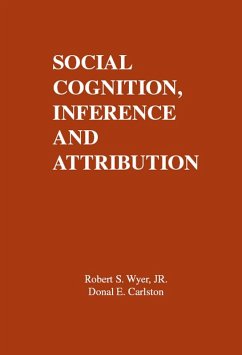
The Oxford Handbook of Social Cognition, Second Edition (eBook, PDF)
Versandkostenfrei!
Sofort per Download lieferbar
109,95 €
inkl. MwSt.
Weitere Ausgaben:

PAYBACK Punkte
55 °P sammeln!
The second edition of The Oxford Handbook of Social Cognition is virtually an all-new update and extension of the historic first edition. It contains over 40 chapters that encompass social cognition's history and methods, primary approaches and theories, and applications both to social psychology and to other social sciences, all written by luminaries in the field. Several chapters from the first edition have been extended and updated by the original authors, but most provide the perspective of new contributors and many address topics and areas not included in the first edition. New perspectiv...
The second edition of The Oxford Handbook of Social Cognition is virtually an all-new update and extension of the historic first edition. It contains over 40 chapters that encompass social cognition's history and methods, primary approaches and theories, and applications both to social psychology and to other social sciences, all written by luminaries in the field. Several chapters from the first edition have been extended and updated by the original authors, but most provide the perspective of new contributors and many address topics and areas not included in the first edition. New perspectives are provided by chapters on such central social cognitive topics as impression formation, dual process theories, motivated cognition, construal level, attention, the self, prejudice and stereotyping, as well as social cognitive approaches to attitudes, personal relationships, evolutionary psychology, cognitive neuroscience, communication, culture, law, health, consumer and political psychologies. Altogether new topics include best research practices, fluency, eye-tracking, happiness, intersectionality, identity threat, morality, embodied cognition and mind perception, among others. Together these chapters provide a comprehensive review of social cognitive theory, research, and applications since its inception in the 1970s, but especially over the past decade, along with thoughtful perspectives on where the field is likely to go next. This handbook represents a definitive statement about how social cognition has developed, what it has become today, and where it is likely to lead us tomorrow. It is an essential resource for anyone whose work touches on social cognition, which is virtually everyone in psychology and related fields.
Dieser Download kann aus rechtlichen Gründen nur mit Rechnungsadresse in A, B, BG, CY, CZ, D, DK, EW, E, FIN, F, GR, HR, H, IRL, I, LT, L, LR, M, NL, PL, P, R, S, SLO, SK ausgeliefert werden.













